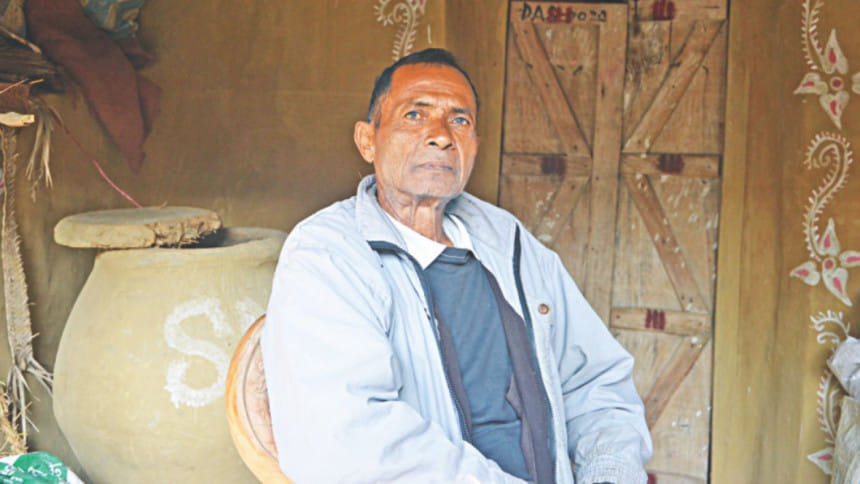Untold tales of unsung heroes

Uttam Kumar Sarder was a tenth-grader when he picked up a weapon to fight for the country's freedom from the Pakistani army in 1971.
But his contributions to the war remain unrecognised as he is a member of Rajshahi's Adivasi Orao community at Abolokpur village, some 15 kilometres away from the city, indigenous leaders say.
“Utter neglect towards the tribal people is a reason for not recognising them as freedom fighters,” said Rabindranath Soren, president of Jatiya Adivasi Parishad (JAP).
He said no survey was conducted, but he knows at least 50 indigenous people from Rajshahi and Rangpur divisions who are still awaiting recognition even after applying for it in the last 10 years.
At his home in Rajshahi's Paba upazila, Uttam has been rearing some cattle and farming on one bigha of ancestral land. His wife Alon Bakla, also a member of the Orao community, contributes to the family by working as a day labourer on the fields, he told The Daily Star.
Among his three children, his only son goes to Rajshahi University; one of his daughters is married while another is a sixth-grader.
“My participation in the war was selfless. I was motivated by freedom. And I never felt the necessity of getting a certificate.”
But now, his son would be greatly benefitted by the recognition in finding a job. “Not for me, I need the recognition to help my children survive.”
With the Indian gazette, where he is listed as a freedom fighter, Uttam applied for the certificate three times already. “I don't know what happens to my applications, or where it goes,” said a bewildered Uttam.
One Orao freedom fighter from his village migrated to India in the 80s, while another Santal of a neighbouring village died a few years ago before he could get the recognition.
Abdul Momin, a group commander during the war, said Uttam was the youngest in his group of nine freedom fighters. “He was our inspiration during those times.”
Uttam took training at Panighata Higher Training Camp in Siliguri of Indian. He fought several battles under sub-sector 4 of sector 7 during the war.
In one battle at Horma village in Chapainawabanj Sadar, he survived a shower of bomb shells near his bunker.
He survived another attack the night before Eid-ul-Azha during the war at the village. He was with 300 other freedom fighters; they were assigned to drive the Pakistani forces out of the local union office, where they had set up a camp.
“We fought from midnight till the next morning. We exchanged fire like rain. We almost cornered the Pakistani forces. But they doubled forces in a couple of hours and forced us to fall back.”
“We had no helmets. Bullets hit nine of our companions and they died while fleeing. I thought that was my last day, but I dodged two bullets that went right past my ears.”
He learnt later that the Chapainawabganj road was stained red with the blood of the Pakistani army, who were carried away in trucks.
After victory, Uttam surrendered his firearms in Rajshahi and returned home to begin anew in a free country. But it was difficult for him.
He passed his matriculation examinations the next year and continued studying and trying to find a job at the same time. Working as a deed writer and then at an NGO for several years, he finally returned home and worked on the fields ever since.

 For all latest news, follow The Daily Star's Google News channel.
For all latest news, follow The Daily Star's Google News channel. 



Comments